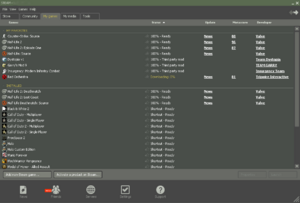Steam (content delivery): Difference between revisions
imported>Subpagination Bot m (Add {{subpages}} and remove any categories (details)) |
imported>Aleksander Stos m (typo) |
||
| Line 14: | Line 14: | ||
===Purchases=== | ===Purchases=== | ||
[[Image:SteamTransaction.png|thumb|right|Part of the payment process for online purchases through Steam.]] | [[Image:SteamTransaction.png|thumb|right|Part of the payment process for online purchases through Steam.]] | ||
Steam allows users to purchase game software through the Steam client. Instead of | Steam allows users to purchase game software through the Steam client. Instead of receiving a game box, CD, DVD, or a serial, the game is downloaded from the Steam servers and is added to a user's Steam account. This game software can then be downloaded to any PC that the user desires. Games can either be bought individually (with some exceptions) or as part of a “package” of multiple games, if one is available, which will provide better value for money. | ||
===Valve Anti-Cheat=== | ===Valve Anti-Cheat=== | ||
Revision as of 05:23, 3 January 2008

Steam is a content delivery system created by Valve Corporation. Its primary use is digital distribution of game software, although it has other features such as game server browsers, friend lists, automatic updates for supported games, and digital rights management. Popular personal computer games such as Half-Life 2 and Counter-Strike are distributed and managed through Steam.
History
Development on Steam began on an uncertain date prior to 2002. Its codenames before 'Steam' were 'Grid' and 'Gazelle'. Steam replaces WON, Valve's original authentication system for older games such as the original Half-Life.
Features
Users can download demos of game software as well as video previews for games. The Steam Community feature lets users create a Steam ID page for themselves, showing what games they have played recently, their friends list, and how many hours of games they have played in the last week. Steam also gives users a rating from one to ten, depending on how often they play games.
Users get a "SteamID" when they sign up for Steam. This ID is a digit showing their member number. It can be used to see how long someone has been a member of Steam, as the digit number rises with each new Steam user. Users who connect to a game server are identified by their SteamID.
Purchases
Steam allows users to purchase game software through the Steam client. Instead of receiving a game box, CD, DVD, or a serial, the game is downloaded from the Steam servers and is added to a user's Steam account. This game software can then be downloaded to any PC that the user desires. Games can either be bought individually (with some exceptions) or as part of a “package” of multiple games, if one is available, which will provide better value for money.
Valve Anti-Cheat
Valve Anti-Cheat (known more commonly as "VAC") is Valve's anti-cheating solution for Steam games.
Free Weekends
Free weekends are promotions in which a game becomes free to play for a weekend, or sometimes for an entire week. Players cannot access the game after the free weekend is over, but they can purchase the game without downloading anything as the game is already on their computer.
Free Weekends are criticized by existing players for flooding a game’s servers with newbies, and allowing cheaters free reign.
